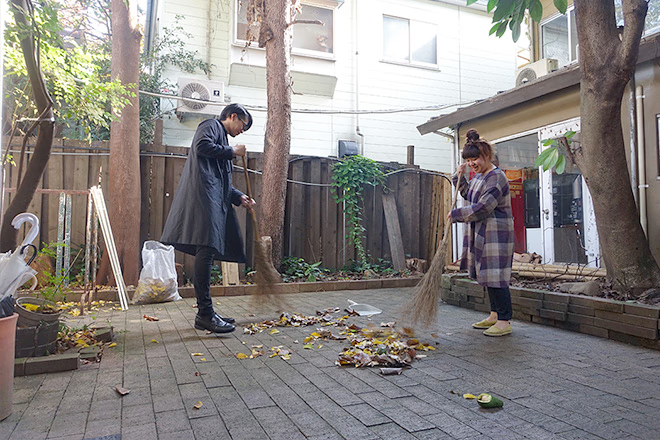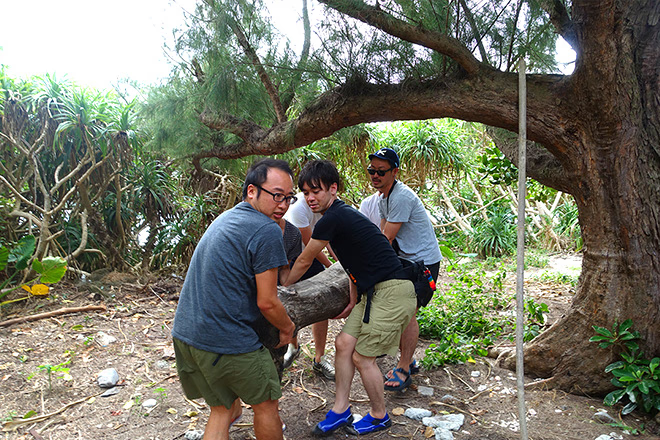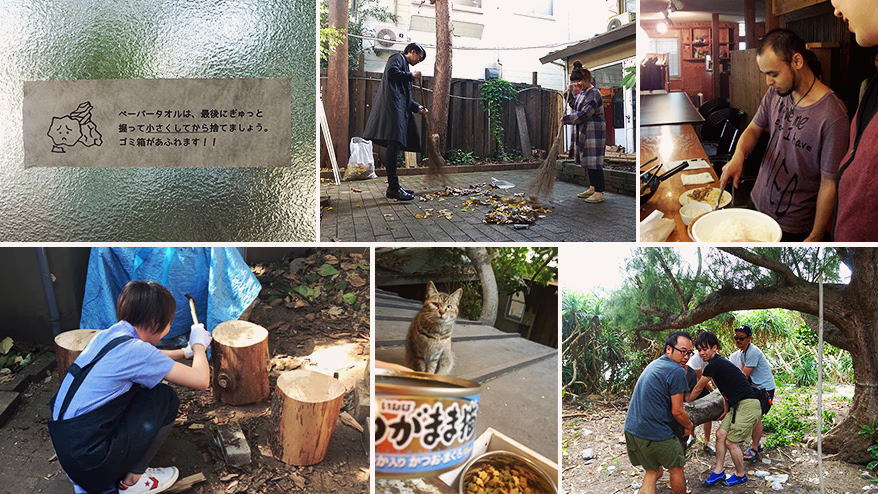モノサスは「すき間」だらけの会社です。
すき間といっても、建物のすき間ではありません。(築50年以上の木造オフィスはすき間が多く、冬はちょっぴり寒いのも事実ですが・・・) 今回は物理的なすき間ではなく、会社のしくみの「すき間」のお話です。
たとえば、オフィスの中庭のそうじ。今でこそ当番制になりましたが、落ち葉がつもっていると当番以外の人もキレイに掃除してくれています。みんなで使うコーヒーメーカーも、毎日だれかが掃除をしているし、ネコ好きのスタッフは、近所のネコたちにゴハンをあげたりネコハウスを作っています。ガーデニングに挑戦する有志もいれば、社食委員のメンバーが布巾を干す台を自作したり、なんてことも。
みんなが思い思いにオフィスを整えたり、お気に入りの空間や、あったらいいなと思うものをどんどん作る。こんなことができるのは、会社のあり方として、いろんなルールや形をキッチリと決めてしまわずに「すき間」を残しているせいかもしれません。
そんな「すき間」を残したモノサスのしくみについて、代表の林にインタビューしてみました。
「すき間」を見つけたら
それに関わってみる。

中庭の落ち葉もキレイに、気持ちよく。
モノサスって、大企業のようにルールがキッチリ決まってない部分が多いので、「これをしてはダメ!」ということがあまり無いように感じます。
「そうだね。トイレを気持ちよく使うための貼り紙があったり、近所のネコを世話していたり、伐採した中庭の木で丸太の椅子を作ったり、みんな思い思いにやっているよね。会社としても、そういうことができる "すき間" をあえて残している部分はあります。そのすき間をみて、自分で考えてほしいなと。」
そんなふうに、あえて「すき間」を残しておくには、何か理由があるんですか。
「すき間があることで、自分たちで考えたり工夫する余地ができるというのがひとつ。もうひとつは、自分が所属するコミュニティに対して、“より良くしよう”というスタンスを持てるようになってほしい、という想いがあります。というのも、そのスタンスを持っているかどうかで、行動の質が変わってくると思うから。」
行動の質というのは?
「会社の備品置き場の棚があったとして、そこに文房具なんかを追加したり整理するような時を想像してみてほしいんだけど、その棚を“自分たちの棚”と思うか、“他人の棚”と思うかで、物の置き方って変わってくると思う。
“自分たちの棚”だと思えば、よく使われるものは手前、あまり使わない物は奥、というように、棚の使いやすさを意識して物を置くと思うけど、”他人の棚”だと思うと、何も考えず適当に置いてしまうかもしれない。
それが積み重なると、その棚が使い勝手のよい、血の通った棚になったり、逆に、使いずらい、雑然とした棚になったりと、差が出てくるんじゃないかな。
それぞれがコミュニティをより良くしたいと思ってやることが、みんなを幸せにするし、結果として自分にもかえってくる。つまり、自分のことだけを考えて自分のためだけに何かをするよりも、幸せの総量が大きくなると思うんだよね。」
すき間に目を向けることで、コミュニティ全体が良くなり、自分も幸せになる。
これは会社だけでなく、自分の住んでる地域や、家族の間でも当てはまることかもしれません。
「すき間」を埋めるDIYが
生き方の選択肢を増やす

社員旅行(座間味島)でのキャンプのひとコマ。丸太を運んでベンチを手づくり。
「そもそも、すき間って "公"(public)と "私"(private)の間にある、いわゆる“共”(common)と呼ばれる部分のことで、ぼやっとした、曖昧なものなんだよね。
たまに、そういうぼやっとした、決まってない部分に対して「じゃあ、何をすればいいですか?」て聞かれるんだけど、そこを定義しちゃうと、もはや仕事になっちゃうかと。
だからこそ、それについてみんなに考えてほしいし、工夫してもらえたらいいなと思っています。」
みずから考えて、工夫してみる。つまり、Do it Yourself(DIY)ということですね。
「そう、DIYってお金にたよらずに問題を解決する手段なんです。
たとえば、旅行代理店に高いお金を払ってツアーに参加しなくても、工夫次第で楽しい旅行はできるし、自分の料理の腕を磨けば高級レストランに行かなくても、おいしい料理は食べられる。そういうことがわかれば、お金との付き合い方も変わってくるんじゃないかなと。」
お金を使わずに工夫することで、見えてくるものがある。
「みんなのプライベートに介入するつもりはないんだけど、お金の使い方が上手にならないと、暮らしの満足度も上がらないと思っていて。実際、DIYの知恵やスキルを身につけることで、お金の使い方が上手くなるし、それによって生き方の選択肢も増えるんじゃないかなと。
お金は稼ぎ方と使い方の両方のバランスが大事。うちの会社でも、お金の稼ぎ方を工夫すると同時に、お金の使い方の効率もあげていきたいなと思っています。 」
お金の使い方が身につくのが、DIYの魅力なんですね。
「あと、DIYって単純に楽しいよね。お金を使って解決したら何も残らないけど、自分たちで工夫して何かをやると、大変だけど楽しいし、知恵やスキルや残る。そうすることで生き方の選択肢も広がって、いいことづくしかなと。」
パブリックとプライベートの間にある「すき間」をDIYで工夫する。
コミュニティをより良くしながら、自分自身にも知恵をたくわえて、生き方を広げていく。
それが「ものさす式DIY」の醍醐味のようです。
次回からは、実際にモノサスではどんな「すき間」をDIYしているのか、具体的にご紹介したいと思います。

